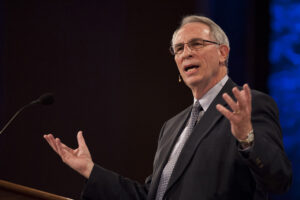
EDITOR’S NOTE: This 1996 Baptist Press story is reprinted here in light of the recommendations to be considered at the 2011 SBC annual meeting stemming from an extensive ethnic participation study conducted by the SBC Executive Committee. This article was published on June 10, 1996, prior to the SBC’s annual meeting that year in New Orleans.
NEW ORLEANS (BP)–Southern Baptists are in danger of becoming “more exclusive and more ‘white'” if they don’t impact the coming Ethnic Millennium, a Southern Baptist Home Mission Board official warned.
Russell Begaye, director of the HMB language church extension division, released a paper on “The Ethnic Millennium” during the ninth annual Hispanic Southern Baptist Fellowship Conference June 8 at New Orleans Baptist Theological Seminary.
“Ethnic Millennium” is a term first used by Alvin Toffler, author of “Future Shock” and “The Third Wave,” to describe 21st-century America as a “de-massified” new civilization focused on ethnic and cultural distinctives in values, work, political movements, religious beliefs and more.
“We have moved from Ozzie and Harriet to the Cosbys, from Walter Cronkite to Connie Chung and from Chevrolet to Honda,” Begaye wrote. “In 1991, salsa out-sold ketchup by $40 million…. The tortilla chip is now consumed by 60 percent of all U.S. households.”
The dawning of the Ethnic Millennium is supported by 1990 U.S. Census records that say one out of every four Americans claim African, Hispanic, Asian or Native American ancestry, Begaye wrote. Immigration and growth has been primarily in mega-cities like San Francisco, Miami and Los Angeles, which means most large ethnic groups reside in California, Florida and New York.
By the year 2000, ethnics will outnumber Anglos in California, he predicted.
In contrast with earlier groups of immigrants who came to America to assimilate into a predominantly European-based economy and culture, Begaye stated ethnics now are “maintaining and/or developing new cultural distinctives.”
The new immigrants defy the stereotype of being uneducated, unruly and dependent on welfare, Begaye wrote. Instead, he wrote, these immigrants are “more diverse and educated,” paying $100 billion in taxes annually and rebuilding the inner cities of America.
Businesses and companies recognize the “entrepreneurial spirit” of new immigrants, Begaye wrote. Catering to the growing immigrant market, banks, grocery stores, hospitals and Band-Aid companies recognize a need to produce products and services that appeal to distinctly different ethnic groups.
“In 1993, companies like Procter & Gamble, Anheuser-Busch and Coca-Cola spent $734 million promoting their goods that target only Hispanics,” Begaye wrote.
Like companies who use today’s technology to study ethnic groups, Southern Baptists can easily locate, analyze and cross-analyze ethnic America, he stated. But high-tech approaches fall short of actually being able to offer much information on how to reach each ethnic group or make programs culturally relevant.
“We must go among the people…. Too many administrative decisions are being made without any knowledge of how they impact the local church or ethnic communities,” Begaye wrote. “Rather than de-massifying our programs, emphases, materials and approaches, we are still trying to fit the 106 ethnic groups we reach into one massive program after another.”
Research techniques developed to target the dominant culture are ineffective for use with ethnics, Begaye stated in his paper. Lifestyle and value differences provide a different frame of reference for ethnics, while cultural issues of language, religion, family patterns, gender roles, education and aspirations continue to be important in understanding the “congregationalizing” of ethnic people groups.
Southern Baptists need to first consider cultural differences, and then present culturally relevant approaches, programs and materials. Six things he stated that people should remember when learning about the cultures are:
1) Learn how to ask the right questions.
2) Continually track emerging trends.
3) Properly use data.
4) Anticipate change.
5) Adjust strategies and programs to each ethnic people group.
6) Seek consultation from the targeted community.
Begaye called on a restructured Southern Baptist Convention [a reference to the mid-1990s SBC restructuring] to appropriately address the questions, “What does this mean for Southern Baptists? What do we need to do within our Southern Baptist culture to impact the coming Ethnic Millennium?”
“If they are not [answered], we will quickly become more exclusive and more white … a remnant of what we once were rather than being a mighty instrument of God in the coming Ethnic Millennium,” Begaye wrote.
Asking SBC educational institutions to broaden their curriculum and to expand their degree programs to include the languages and cultures of ethnic students, Begaye called for more sensitivity to cultural distinctives and for SBC entities to employ ethnics for upper•management positions.
“The Southern Baptist political structure must intentionally broaden ethnic representation on all boards of trustees,” he wrote. He applauded the work of the SBC Inter•Agency Council resolution that called for, among other things, “the eradication of all forms of racism” and the inclusion of more ethnics in SBC agencies, and as trustees on boards.”
Hiring ethnics on state convention staffs, working more closely with ethnics in associational work and establishing ethnic missions councils at the associational level would boost communication between groups for more effective ministry, Begaye wrote.
“If we are serious about impacting the Ethnic Millennium,” he concluded in his paper, “the new president of the North American Mission Board must be bilingual or even trilingual.”
–30–
Joni B. Hannigan is managing editor of the Florida Baptist Witness, on the Web at www.goFBW.com. When she wrote this article in 1996, Hannigan was a national correspondent for Baptist Press.















